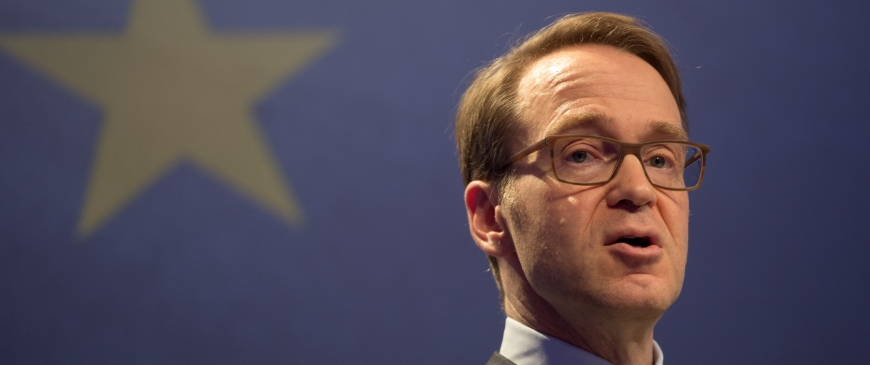
Europe must prevent a German stranglehold on the ECB
It’s no secret that Bundesbank boss Jens Weidmann would like to succeed Mario Draghi as president of the European Central Bank. However, the German would not be the right man for the job. The challenges that lie ahead – a weakening eurozone economy and a potential crisis in Italy – require bolder measures than Weidmann is willing to contemplate.
Finding the next ECB chief is part of a larger puzzle of hugely important personnel decisions that EU leaders have to make after the European Parliament elections. In the running is Finland’s Erkki Liikanen and Olli Rehn, Frenchmen Benoit Couere and Francois Villeroy de Galhau, and Weidmann.
The ECB has evolved substantially under Draghi. When he took over from Jean-Claude Trichet in November 2011 the central bank was still unsure about its role in the eurozone crisis. Trichet argued it was the job of governments, not the central bank, to fix the problems of the single currency area.
But in the summer of 2012, Draghi pledged “to do whatever it takes” to preserve the euro. He followed that with a programme called Outright Monetary Transactions, promising to buy government bonds in unlimited quantities to stabilise sovereign debt markets if necessary. This established the ECB as the lender of last resort to eurozone governments and was the key to arresting the euro crisis.
Draghi’s monetary policy record is mixed. He reversed Trichet’s rate hikes, and supported the banking system with ample liquidity. Under his leadership, the ECB also started quantitative easing bond purchases for the first time in early 2015 to stimulate the economy.
But Draghi acted only when economic circumstances made more monetary stimulus almost inevitable, which is too little too late. Central banks need to act pre-emptively and cut rates early, especially when rates are already low. The ECB’s own estimates indicate inflation will not return to its 2pc target any time soon – Draghi has failed to fulfil the bank’s primary mandate.
The two biggest risks for the eurozone are a weakening economy and a crisis in Italy. But with little room left to lower interest rates further or expand its QE program, the next ECB president will have to find new ways to stimulate the eurozone economy or support one of its biggest member states.
One way would be to expand an existing programme called TLTRO, which subsidises bank lending to the economy at negative interest rates. Another is much stronger “forward guidance”. The ECB would commit to keeping interest rates lower for longer than would otherwise be the case.
Governments would also need to play a role. The ECB is not directly responsible for fiscal policies, but it does shape the economic narrative. If there’s a crisis, the next ECB chief would probably have to go further than Draghi’s call for a fiscal boost to help the ECB stimulate the economy.
Champions of Weidmann argue that it would be best for the German public to hear from one of their own that more monetary stimulus, a stronger fiscal stimulus or the ECB as a lender of last resort is necessary. But the downsides of a Weidmann presidency outweigh such benefits.
First, Weidmann not only opposed the OMT programme in the ECB governing council. He also testified against it in the German constitutional court in person and with a detailed written statement by the Bundesbank. Essentially, the Bundesbank view is that it is not the job of the ECB to act as lender of last resort to governments.
The Bundesbank and Weidmann denied that it was the job of the ECB to prevent countries from being forced out of the eurozone. President Weidman would immediately face questions on whether Draghi’s “whatever it takes” commitment still stands.
The three main building blocks of OMT are independent of the ECB president: the consensus in the governing council; the tacit approval of Germany and France; and the ruling of the European Court of Justice upholding OMT’s legality. But there is a risk that OMT might be undermined without the ECB president’s full support.
The second downside is that Weidmann would not make the ECB more proactive in fighting the next recession. Draghi’s ECB was too slow and reactive – but Weidmann at times thought it was going too far. He also undermined the success of these policies as dissenting members can weaken the impact of monetary policy. He may be less outspoken than in the past, but his views have not changed.
The next downturn will require bold, creative and early action by the ECB. A Weidmann ECB is less likely to deliver the necessary stimulus or push governments to be more active on fiscal policy.
Finally, Germany already dominates eurozone policy-making. It has a de facto veto on using the main eurozone bailout fund, the European Stability Mechanism (which is headed by a German, Klaus Regling). Germany is also blocking further reforms to the architecture of the eurozone.
Policy-makers should avoid fueling the perception that the eurozone is run for and by German interests. Chancellor Angela Merkel herself is acutely aware of this. She is unlikely to support Weidmann’s bid – others shouldn’t either.
Christian Odendahl is the chief economist at the Centre for European Reform.
